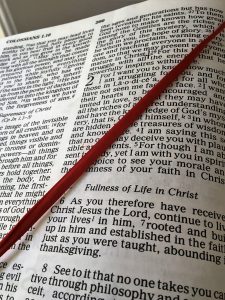1 John 5:13
I have written these things to you who believe in the name of the Son of God so that you may know that you have eternal life (CSB).
The second support is that of a changed life. We know that we have come to know him if we keep his commands. Whoever says, “I know him,” but does not do what he commands is a liar, and the truth is not in that person. But if anyone obeys his word, love for God is truly made complete in them. This is how we know we are in him: Whoever claims to live in him must live as Jesus did (1 John 2:3-6 NIV). To use our previous illustration, this is like showing you my wife and having her testify that we are married. If I claimed to be married, and no one ever saw my wife, you would rightly be suspicious of my assertion.
At this point we must be careful, because of what I’ll call “short-checklist morality”. When most people think of sin, they confine themselves to a few of the prohibitions of the Ten Commandments, like don’t murder, don’t commit adultery, don’t steal, and don’t bear false witness. They might add a couple other prohibitions to their list, but they assume that “holiness” concerns the avoidance of the items on their checklist. And they evaluate others the same way. For example, if homosexuality is on their list, they’ll be proud that they’re not and roundly condemn anyone with even homosexual tendencies. This short-checklist morality twists their own view of true Christianity and also what others think a true Christian is or isn’t. If they keep their short checklist, they assume that they have evidence of salvation. But that is not the changed life the Bible presents. I’ll explain.
- The apostle John wrote: We know that we have come to know him if we keep his commands. Clearly, this means the commands that tell of godliness for new covenant believers, but I’ll avoid explaining the reasons in this post. To be brief, this means what the Spirit gave as directives to us in all the Scriptures, but according to the age in which we live in redemptive history. These commands involve many prohibitions and many positive commands and instructions and godly wisdom and encouragements.
- This means not only theoretical agreement, but also practical performance of what the Lord commands us: Whoever says, “I know him,” but does not do what he commands is a liar, and the truth is not in that person.
- This kind of obedience springs from love for the Lord. But if anyone obeys his word, love for God is truly made complete in them. A person might say, “I never steal, and I love to tell the truth.” That’s nice. But if they don’t love God in the process, they have never actually obeyed, because love for God is indispensable for obedience. Love does no harm to a neighbor. Therefore love is the fulfillment of the law (Romans 13:10 NIV).
- We do not truly obey unless we model the character of Jesus Christ. This is how we know we are in him: Whoever claims to live in him must live as Jesus did. In every act of obedience, he pleased the Father (John 5:30; 8:29). He rejoiced to please the Father, even in the most difficult time (Hebrews 12:2). This is the kind of life God the Father expects from us, too, a life that pleases the Lord (2 Corinthians 5:9; Ephesians 5:10; Colossians 1:10; 3:20; 1 Thessalonians 2:4; 4:1; 1 Timothy 2:3; Hebrews 11:6; 13:16; 1 John 3:22).
The apostle John tells us that we will be able to see a two-part witness of the reality of our salvation, and that this testimony is one of the three bases of assurance. If we lack this testimony, we have a serious crack in our assurance. There is the witness of love for other Christians. This is a witness to ourselves (1 John 3:14). It is also the witness to others (John 13:34-35). We also can see the witness of a holy life (1 John 2:29; 3:3; 5:4). We stop doing some things (1 John 3:8-9). We put sin to death (Romans 8:13; Colossians 3:5). We begin to do other things (1 Jn 2:29; 3:10). This is the process of continual renewal (Colossians 3:12-17; 2 Peter 1:5-11).
This makes a proper doctrine of spiritual growth so important. If you seek to become godlier in the wrong way, you may corrupt your assurance of salvation. We must avoid a common error—making our growth in grace a source of confidence before God. That is legalism, and the error of many in both Reformed and Fundamentalist circles. A truly growing godliness is the product of union with the risen Christ (Romans 7:1-6). Christ alone must be our joy and confidence! The holy witness is a sign of what he is doing in us by his Spirit.
Grace and peace, David

 Happy Thanksgiving!!!
Happy Thanksgiving!!! 2 Chronicles 20:15b-17
2 Chronicles 20:15b-17 Ruth 3:10-18
Ruth 3:10-18